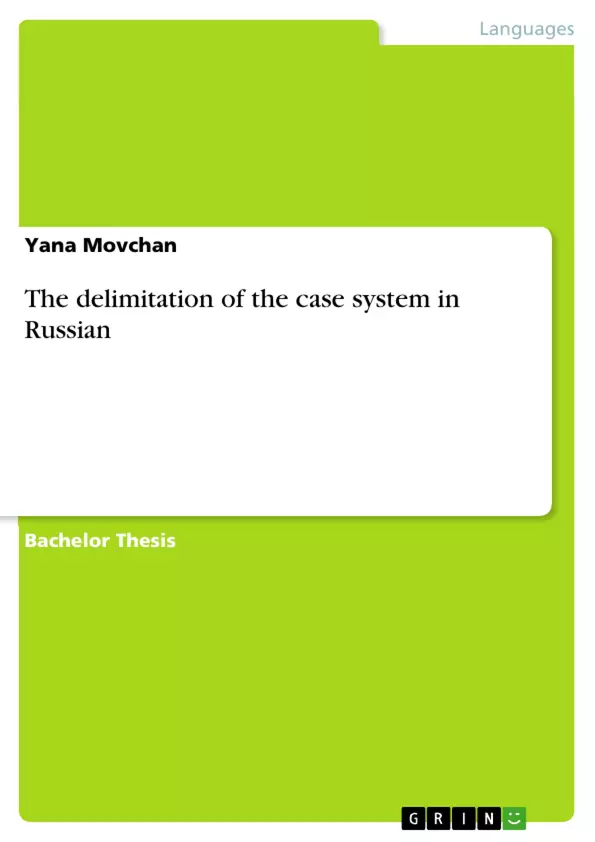It is well-known that the Russian language has six cases: nominative, accusative, genitive, dative, instrumental, and prepositional. However, some linguists argue that Russian has a separate vocative, a locative and two genitives, such as partitive and nonpartitive genitives (Comrie 1986: 86). This term-paper demonstrates the development of the Russian case system. Since the considered subject is extremely large only three approaches will be demonstrated. The distributional approach proposed by Bernard Comrie will be compared to the approaches of A.A. Zaliznjak and A. N. Kolmogorov. This paper will begin with a quick look at the Russian case system represented by traditional academic grammars such as Russian Grammar edited by N. Ju. Švedova. Then, some new theories on delimiting cases will be presented and examined in practice. When dealing with delimiting cases, researchers have split the concept of case into two separate directions: the formal and the functional. Using different methods, linguists are trying to juxtapose these approaches to find out and eliminate the equivocations in Russian case system. There is no one-one correspondence between formal and functional approach. Finally, we will try to find out how large is the discrepancy between these two concepts in Russian and how many cases could be distinguished using these theories.
Table of Contents
- Introduction
- Different Approaches to Distinguishing Cases in Russian
- The Academic Grammar Viewpoint at the Russian Case System
- The Extremist Formal Approach
- The Extremist Functional Approach
- The Distributional Approach
- Delimiting Cases
- Synthesis of Cases
- The Second Genitive: Partitive Genitive
- The Locative
- The Case of Accounts: Счетный падеж
- The Waiting Case: Ждательный падеж
- The Inclusive Case: Включительный падеж
- Zalizniak's Case System
- The Depriving Case: Лишительный падеж
- The Second Dative: Второй дательный
- The Comparison of All Distinctive Cases in Russian
- Conclusions
- Abbreviation
- Bibliography
Objectives and Key Themes
This paper explores the complex nature of the Russian case system, focusing specifically on the debate surrounding the delimitation of cases beyond the traditional six. The objective is to analyze various theoretical approaches to identifying cases in Russian, highlighting their strengths and limitations. * **Formal vs. Functional Approaches**: The paper explores the contrasting methodologies used in defining cases, examining the interplay between formal and functional perspectives. * **Case Delimitation**: The paper delves into the identification and analysis of potential cases beyond the traditional six, including the vocative, locative, and multiple genitive forms. * **Distributional Approach**: The paper analyzes the distributional approach proposed by Bernard Comrie, contrasting it with the work of A.A. Zaliznjak and A. N. Kolmogorov. * **The Russian Case System**: The paper provides a comprehensive overview of the Russian case system as presented in traditional academic grammars, highlighting its limitations in addressing the complexity of case delimitation. * **Discrepancy Between Formal and Functional Approaches**: The paper investigates the extent of the discrepancy between the formal and functional approaches to case identification in Russian.Chapter Summaries
- Introduction: This chapter introduces the ongoing debate regarding the delimitation of cases in the Russian language, highlighting the existence of potential cases beyond the traditional six. The paper outlines the main theoretical approaches explored in this research, specifically focusing on the work of Comrie, Zaliznjak, and Kolmogorov.
- Different Approaches to Distinguishing Cases in Russian: This chapter introduces the various approaches to distinguishing cases in Russian, emphasizing the distinction between formal and functional perspectives. The chapter begins with an overview of the traditional academic grammar viewpoint, which recognizes six cases.
- Delimiting Cases: This chapter delves into the identification and analysis of specific cases beyond the traditional six, exploring various theoretical frameworks. It examines the synthesis of cases, the concept of a second genitive, the locative case, the case of accounts, the waiting case, the inclusive case, and the case system proposed by Zalizniak.
- The Comparison of All Distinctive Cases in Russian: This chapter compares the different distinctive cases in Russian, highlighting their defining features and characteristics. It examines the similarities and differences between these cases, providing a comprehensive analysis of the Russian case system.
Keywords
This paper focuses on the Russian case system, exploring the delimitation of cases, formal and functional approaches, the distributional approach, and the work of linguists like Bernard Comrie, A.A. Zaliznjak, and A. N. Kolmogorov.Frequently Asked Questions
How many cases does the Russian language traditionally have?
Traditional academic grammar recognizes six cases: nominative, accusative, genitive, dative, instrumental, and prepositional.
What are "additional" cases discussed by linguists?
Linguists like Zaliznjak and Comrie discuss potential extra cases such as the vocative, locative (second prepositional), partitive genitive, and the waiting case.
What is the "Distributional Approach" to cases?
Proposed by Bernard Comrie, this approach identifies cases based on the distribution of word forms in different syntactic environments.
What is the difference between formal and functional approaches to case?
The formal approach focuses on morphological changes (inflections), while the functional approach focuses on the grammatical and semantic roles a noun plays in a sentence.
What is the "Waiting Case" (Ждательный падеж)?
It is a specific case form used with certain verbs of waiting, where the object can appear in a form that is neither purely accusative nor purely genitive.
- Quote paper
- Magister of Philology Yana Movchan (Author), 2009, The delimitation of the case system in Russian, Munich, GRIN Verlag, https://www.grin.com/document/138803



